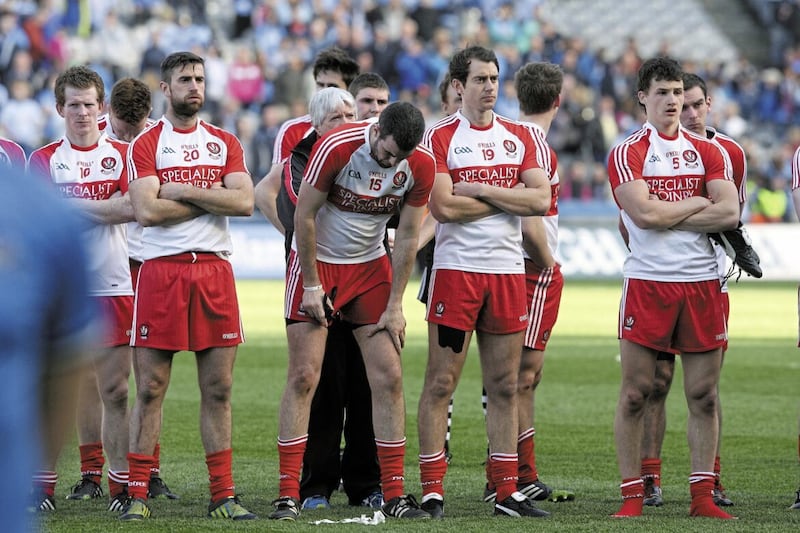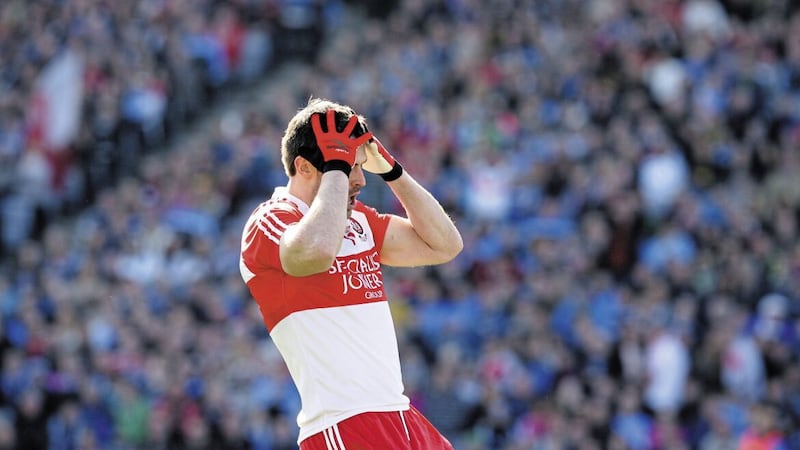AS the Derry forwards marched through the warm sun, they found the shadows of the Canal End unwelcoming.
Cailean O’Boyle had come up against Philly McMahon six weeks previous in Celtic Park.
He’d caused problems for the All-Ireland champions’ defence. An awkward presence in the air, he was denied a clear penalty when Sean George tore him to the ground just before half-time.
Five minutes after the break, a high ball came in between the pair. McMahon left O’Boyle’s ears ringing and his game over.
“I just was seeing black.”
Mark Lynch was rampant though, winning the game all on his own. He scored 1-8 of Derry’s 1-16 as they downed the Dubs.
They finished second in the table and then beat Mayo in the semi-final having played most of the game with 14 men. The country was sitting up to take a bit of notice.
Enda Lynn was ripping up defences too. In a recent podcast going back over his career with Shane Rice, Lee Keegan recalled how tough he’d found Lynn to deal with that day.
“He gave me a right toasting in Croke Park. Brilliant footballer, he gave me an awful time of it.”
Six weeks between visiting Derry city and the league final was a long time for Dublin to stew and heal.
“I went in to shake Philly’s hand before the final and he started rubbing my face and going ‘Did you recover ok, wee man?’ You just knew from that. They were a different animal that day,” O’Boyle recalls.
Speaking to Andy Watters of this parish last summer, Brian McIver had his own memories.
“Enda Lynn was decked before the ball was thrown-in and all of a sudden it was a real war,” said the then-Derry boss.
His side had perhaps been slightly lulled by their Celtic Park victory.
Jim Gavin had no Bernard Brogan, Diarmuid Connolly, Paul Flynn, Cian O’Sullivan, James McCarthy or Rory O’Carroll to call on that day. All six started the final.
What changed on paper naturally translated.
Derry actually started the final well. They’d scored 13 goals on their way there, with the triangle of Lynch, O’Boyle and Emmett McGuckin accounting for nine of them.
The black card had just been introduced. It had quickly become a trademark of the team that Lynch would come up the middle and with teams scared to foul him, he’d either go himself or palm it to one of the inside duo.
“We practiced that a lot. There was a boy from Lavey telling me he did me first goalscorer in every game and got himself a holiday in Spain,” laughs O’Boyle.
He had his goal inside four minutes of the final. Lynch caught Thomas Mallon’s kickout. Laid it to Fergal Doherty, who laced it 70 yards into the sky.
McMahon got caught under it, then distracted looking to the referee for a foul. He was drawn to McGuckin, who had won the ball goal side of O’Carroll, leaving O’Boyle free at the far post to palm home.
In the following fifteen minutes, Dublin scored nine unanswered points. They led by eight at the break.
In the second half they added three goals. It finished 3-19 to 1-10. The winners hit 17 wides.
“We went into the final expecting to win,” says goalkeeper Thomas Mallon.
“But there’s ways of losing. Psychologically, that defeat definitely had a landslide effect to the Donegal game and the Longford game.
“Getting hammered by 15 points, and even at that, Dublin hit so many wides, it was more like a 25-point hammering.”
The Dubs’ first goal caught everyone in the stadium out. Bernard Brogan was on his left side, right on the 21-metre line, bodies everywhere.
He unleashed a rocket. Mallon signalled it wide. It didn’t go wide.
The ball came back out off the stanchion so hard that he assumed it had hit the crossbar or post. When nobody else reacted to the loose ball, he realised. But the crowd’s reaction told the tale.
It wasn’t the ‘ooh’ it deserved. It was an ooh that said unlucky, not brilliant. Very few people in the ground realised it had found the top corner until the umpire lifted the green flag.
“I don’t think if I had a stepladder I would have got up to save it if I’m honest.
“After the game I happened to meet him on the pitch and said ‘did you mean it?’ He told me he was aiming for the crossbar, if it went underneath happy days, if it went over happy days.
“He said if he tried it 99 times again, not a chance would he do it again.
“I’ve had it sent to me a few times over the years - Postie the umpire, wagging the ball wide!”
__________________________________
NATURALLY the defeat rocked Derry’s confidence.
They had a month to scramble a recovery for the visit of Donegal in the first round of Ulster.
Celtic Park was sold out for the first time in 20 years, and for the last time prior to Dublin’s visit three-and-a-half weeks ago.
Mark Lynch was in Allstar form. He was in the shape of his life. Every day he met Paddy Tally, Derry’s coach at the time, at the Falls Baths for extra sessions.
But Donegal’s blanket knew he was coming. He had Karl Lacey in ‘if he goes to the toilet you go with him’ form.
“I never ran as much in my life in a game. But that was part of the plan, if I was to take three or four men with me,” Lynch recalled in 2020.
“That created space for someone else. And it nearly worked.”
Niall Holly fumbled the ball with a goal on just before half-time. Thereafter Donegal managed the game to perfection, quickly turning a two-point deficit into a six-point lead after the break.
“We were beaten by three points but if we were still playing that game until today, I don’t think we were ever really in the position to go on and win it,” O’Boyle offers honestly.
They felt going into the game they had recovered psychologically from Croke Park. In some ways they had.
But when Donegal beat them, every little bit of scarring showed up.
“The Derry lads were really taken aback from it [the Dublin game] and never recovered,” McIver said last year.

Whereas Donegal went on to reach the All-Ireland final, stunning the Dubs in that unforgettable semi-final, Derry’s summer was over before it ever started.
In the month between Donegal and facing Longford, they lost eight of their starting line-up through injuries and defections. The heart had been ripped out of them.
Longford, their bogey team, came to Derry and won.
O’Boyle was in Boston by then.
“I remember being in America and seeing the result. I wasn’t surprised, put it like that,” says the Lavey man.
“It’s like anything, you put everything towards this massive goal and it doesn’t happen, you’re left flat-footed and feeling all the effort was for nothing.
“It’s very hard to motivate yourself again. That was the problem with that situation.”
It started a barely believable cascade for Derry football.
They were relegated from Division One the following spring. After surviving their first year in Two on score difference, they dropped to Three in 2017 and then to Four at the end of 2018.
On Sunday, they’ll march back in to Croke Park for a league final with Dublin.
A Division Two curtain-raiser is not where you’d expect to find Dessie Farrell’s men but they’ve been the second-best team in the second division.
What will be different from nine years ago is the Dublin that came to Celtic Park will look virtually identical to the Croke Park version.
Thomas Mallon was there as goalkeeping coach for the first three years under Rory Gallagher.
He found it to be a totally different setup to when he was playing, and one where they were very clear about the need to get back into Division One.
“That was the ultimate. There was no championship talk, no talk of winning All-Irelands, it was very simple – to dine at the top table, you have to play week-in, week-out against the best teams in Ireland.
“Realistically, to be competing for All-Irelands, Derry need to be in Division One. That was priority at the start of the year.
“They’re the best defensive team in Ireland and that’s not down solely to the six defenders, that’s the midfielders and six forwards, the pressure they put on.
“Benny Heron, Niall Loughlin, Ethan Doherty, Paul Cassidy, Shane McGuigan – your marquee talisman, the work he puts in off the ball is unbelievable. This is a team.
“Back in the day it was more fragmented, there just wasn’t that honesty with each other.
“Beating Dublin in Celtic Park is brilliant but beating them in Croke Park is a different ball game. If they can do that, anything is possible.”







